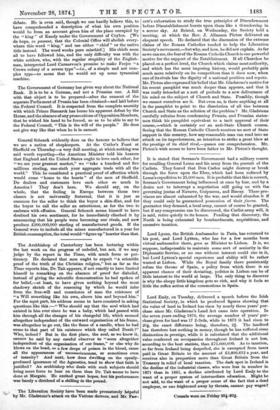The Archbishop of Canterbury has been lecturing within the last
week on the progress of unbelief, but not, if we may judge by the report in the Times, with much. force or per- tinency. He declared that men ought to expect "a scientific proof of the truth of the Christian religion," but as far as the Times reports him, Dr. Tait appears, if not exactly to have limited himself to remarking on the absence of proof for disbelief, instead of giving the scientific demonstration he had spoken of for belief,—at least, to have given nothing beyond the most shadowy sketch of the reasoning by which he would infer from the free-will and conscience of man the existence of 3'.a Will something hie his own, above him and beyond him." For the most part, his address seems to have consisted in asking questions like this :—" Who should say that the soul which had existed in him ever since he was a baby, which had passed with him through all the changes of his changeful life, which seemed altogether independent of the outward organisation of his frame, was altogether to go out, like the flame of a candle, when he had come to that part of his existence which they called Death ?" Who, indeed ? But in the first place, the soul, as we know it, cannot be said by any careful observer to "seem altogether independent of the organisation of our frame," or else why do blows on the head, Or a few drops of poison in the blood, cause all the appearances of unconsciousness, or sometimes even of insanity? And next, how does dwelling on the openly- professed ignorance of the Agnostics, tend to show that faith is justified? An archbishop who deals with such subjects should bring more force to bear on them than Dr. Tait seems to have done at Margate. He excited great hopes, but his performance was barely a dividend of a shilling in the pound.






































 Previous page
Previous page